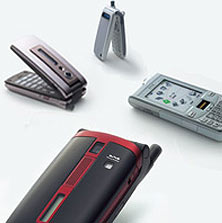 Japan’s Willcom will launch four PHS mobile handsets this November packed with many of the same functions as high-end DoCoMo or KDDI models. Functions for the WX310K and WX300K both by Kyocera; Sanyo’s WX310SA; and JRC WX310J include a PC document viewer, NetFront V3.3 internet browser, Intellisync for Outlook, fingerprint authentification, music player, pixel reader, macromedia flash, even Bluetooth — all at rates the bigger carriers will find hard to match.
Japan’s Willcom will launch four PHS mobile handsets this November packed with many of the same functions as high-end DoCoMo or KDDI models. Functions for the WX310K and WX300K both by Kyocera; Sanyo’s WX310SA; and JRC WX310J include a PC document viewer, NetFront V3.3 internet browser, Intellisync for Outlook, fingerprint authentification, music player, pixel reader, macromedia flash, even Bluetooth — all at rates the bigger carriers will find hard to match.
PHS (personal handyphone system) subscriber numbers, long in free fall against 3G mobile carriers, are slowly climbing back from the abyss thanks to low-cost fixed-rate subscriber packages that are saving consumers bundles of yen. Currently Willcom has an inter-service flat call rate under 3000 yen ($26) per month. The company has announced they will introduce a flat rate mobile data fee of just 3,800 yen ($33) to coincide with the release of the new 300/310 series. PHS subscribers will be able to dig in to a full buffet of mobile services for around 6,700 yen ($58) a month.


 Japan’s
Japan’s  The recent guest article,
The recent guest article,